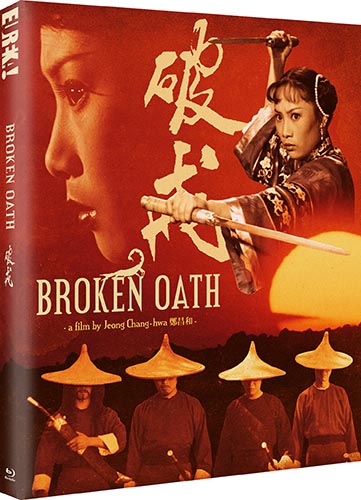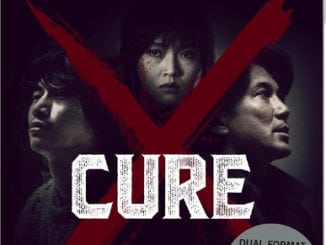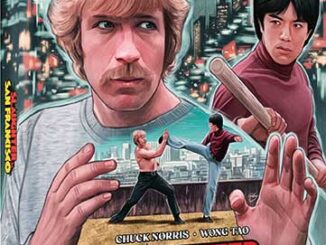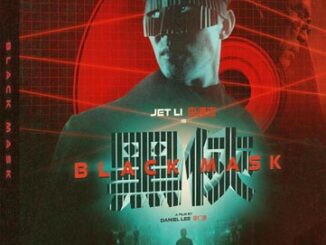Broken Oath (1977)
Directed by: Chang-hwa Jeong
Written by: Kang Shih
Starring: Angela Mao, Michael Wai-Man Chan, Shan Kwan, Siu-Lung Leung
AKA PO JE
HONG KONG
AVAILABLE ON BLU-RAY: 2ist October, from EUREKA ENTERTAINMENT
RUNNING TIME: 98 mins / 102 mins
REVIEWED BY: Dr Lenera

A woman lies dying in a women’s prison after giving birth and recounts to Thousand Hands, a pickpocket, how she ended up there after her husband was murdered by four thugs, one of whom also raped her. The pickpocket agrees to raise her daughter to seek revenge, but in hopes of breaking the cycle of violence she hands the infant over to a Shaolin monastery for women. ‘Pure Lotus’ Liu grows up to be a troubled young woman who skips out on Buddhist lessons, but excels at Kung Fu. She’s kicked out after killing several thugs and rejoins Thousand Hands, where she discovers the truth about her parents. Aided by Ah Shu, a protege of Thousand Hands, Lui begins a systematic hunt….

While I certainly don’t deny that film’s classic status, it’s perhaps a bit sad that Angela Mao’s most seen role is her five minute one as Bruce Lee’s sister in Enter The Dragon, considering how strong much of her other work is, but that’s the Bruce Lee factor for you. Eureka Entertainment’s release of several of her movies really showcase her charm, her presence and her skill. Both delicate and steely, she really makes you believe that she can whoop a huge amount of ass. Broken Oath was her last production for Golden Harvest and it was a fine one to go out on. Resembling and feeling like a Shaw Brothers production in some ways, it’s easily one of her best, possibly is her best [at least out of the films that I’ve seen], and if it isn’t her best it probably showcases her at her best, utilising her skills and her attributes to their very best advantage as well as allowing herself to give a fine performance, her part seeming almost tailor-made for her while also allowing her to be a bit more overtly sexy, though done with a light touch, in a few places. She’s just amazing in it! The plot is constructed in a way that, for the first third, there’s not actually any fighting, which might disappoint some, but to be honest things are engrossing enough anyway, the story being allowed to build nicely before the mayhem begins in earnest and only significantly slows down again in one section. The film is actually a remake of Lady Snowblood, the 1972 Japanese Chambara film which was a major influence on Kill Bill. Now for some reason, despite very much liking Quentin Tarantino, I haven’t actually seen Lady Snowblood [maybe writing this review will finally get me to do so], so I’m not going to be able to compare Broken Oath to it, but I reckon that Broken Oath probably holds its own and that Quentin likes it too.
The titles play over painting of life in China’s Qing dynasty, a nice way to begin even if the music heard seems rather too light for the film. We see s ship at sea, containing some female captives being taken to an island. One of them has “a life sentence for trying to kill a court official” but she’s defiant. “Say what you like, I’m innocent, you people can’t hurt me anymore”. Escape is practically impossible because lots of sharks are in the water and a ship only arrives every three months, but if she does as she’s told she’ll be alright, she’s told. She’s befriended by an older lady, Thousand Hands, named that because of her pickpocketing and we get a snatch of a flashback in an inventively handled bit where four men are zoomed into and their faces appear in a line in irises. Thousand Hands tells her to “forget justice”, her own husband having been “executed for not paying his taxes” and just have her baby. On the day of her labour, she tells her friend her sob story. She’s the widow of the late General Liu who was murdered by four of his subordinates. After the assassination, one of them, despite the objections of another, raped her. “If you’re clever and do as you’re told, you’ll live a life of luxury” he said to her as we’re shown some surprising closeups of her naked body, but when she fought back and stabbed him in the eye he had her turned over to the authorities for attempted murder. Upon giving birth, the woman declares that her child will be filled with the hate necessary to seek revenge, then promptly dies. Thousand Hands decides to take care of the baby and for seemingly no other reason but that the plot requires it is able to leave the prison and go back to society. She takes her to the Wisdom Stone Temple and tells the Abbess “I don’t want her to take revenge although it was her mother’s final wish; if you could enlighten her, teach her the ways of Buddha, show her the light”?
The Abbess is only too happy to take her in. Mao is then given a great entrance, coming into view as the adult “Pure Lotus”. She excels at martial arts training, which is great though she’s rather overly enthusiastic. “If I want to win, there should be one more blow”. And she sneaks out of her Buddhist recitation class, in the English dub speaking the Ten Commandments which aren’t much different from the ones in the Bible even in the Chinese version which calls them the Ten Precepts of Buddha, to practice kung fu on her own, something she probably does often. There’s a lovely shot of her training with her staff by a lake, but her idyll is interrupted by three rapists. After a tiny swords vs staff exchange, two are beaten to death and one is tied to a tree and has a scorpion placed on him so that she can watch him he stung and die. She seems to rather enjoy this, and it’s not exactly Buddhist behaviour, so the Abbess chucks her out of the monastery. I therefore assume that the “broken oath” of the film’s title is her breaking of the rules. Arriving at her godmother’s house, Lotus finds out the truth about her parents, but spends some time with a young protégé of hers named Ah Shu, the story suddenly flashing forward; it would have been nice to see the two first meeting. Lotus then sets her sights first on Hou, one of the murderers and now the owner of the local gambling den. He was also the man who raped her mother and condemned her to prison, but this isn’t mentioned. Lotus doesn’t seem to know this, but wouldn’t it have been more satisfying for us if he’d been left to last? Her actions also sometimes seem unnecessarily complicated, while not one or two but three mysterious strangers, one of them so mysterious that he hides his face, keep on appearing, sometimes to help out. What are their agendas?

What with Mao’s character pretending to be a prostitute at one point, acting very flirtatious though she’s not given any sleazy scenes, this film exploits her sex appeal more than usual, which means that it’s odd that Lotus doesn’t have a romance with Ah Shu, As with many female-led except of the time, our heroine is offscreen for long periods and rather a lot of male characters show up. Was it thought that audiences wouldn’t believe a woman carrying out revenge without male assistance. The action, choreographed by Hsia Hsu and Yuen Woo Ping, whose touch can definitely be seen in the last 20 minutes, is fast and smooth, and, even though it does contain a bit where Mao punches sonebody thrugh a window and sends him flying thirty feet, is generally fairly grounded despite allowing for a variety of weapons, with there being less emphasis than usual on Mao’s Hapkido skills, though she still gives her most convincing fighting performance, at least out of these Eureka’s. The first major fight kicks off when Ah So and Thousand Hands are threatened and beaten in their house, and thereafter Mao is beating up goons all over the place, and sometimes single ones like a guy with a spiked metal glove for a hand. She certainly gets the lion’s share of the fighting, but Bruce Leung is around to sometimes assist with his amazing kicks and battle perennial villain Michael Chan Wai-Man in the terrific climax which also has Mao fight Cheung Pooi-Saan, with a dozen masked fighters that dressed exactly like him popping up from behind him in a very cool moment, Kuo Cheng-Yu fight Han Ying-Chieh who doesn’t just have steel shoes but is able to breathe fire, and Mao face off against Sammo Hung, sporting a fake beard and shaved head, and wielding a pair of star-like knives connected via a cord that can be swung like a flail.
The essential seriousness of the revenge plot is always maintained, though room is found for some humour, often involving Ah Shu, with Yu Ma giving a nice comedic performance which never outstays its welcome or threatens the balance of the movie. There’s a well choreographed bit of thievery in and outside a teahouse and a less goofy-than-usual Dean Shek, who shows that he can bust a few moves, then fleeing his opponent, saying to himself “he might think that he’s a great fighter, but I can still escape from him” – before it being shown to us that, actually, he can’t escape from him at all. A revelation where aphrodisiacs are mistakenly stolen would have probably resulted in some extended tomfoolery if this film had been made in the ’80s, though it still takes place during a breather between two lengthy sections of fighting, though there’s no major training sequence, unfortunately. The revelation of the identity of the person from whom said aphrodisiacs were stolen from is the most impactful of several similar revelations in what is a fairly decent plot, all in all, involved but not muddled or confusing, even if not enough time is given to the afore-mentioned character which could have allowed for some exploration of the moral issues concerning revenge and all that. We do sometimes seem to be asked to think that Lotus dispenses her justice with maybe a bit too much relish, and we certainly wonder how she’ll fare one her mission is completed, but mostly of course we’re just invited to enjoy her dispatching of her four targets and anybody else who gets in her way.
Director Jeong Chang-hwa, who never really recaptured the success of the seminal King Boxer, gives us an often nicely shot piece, though the Golden Harvest sets look even cheaper than normal. And was this intended to be shot in 3d? There are a lot of weapons being lunged at the screen in the final act. There’s surprisingly little music and much of it is traditional background music which doesn’t always seem to fit. Nonetheless this is another fine Mao outing where she gives her best. She was truly unique, a magnetic movie presence who I’m not sure ever got the chance to show her full potential – and I’m not talking about her fighting skills.
Rating: 









.
SPECIAL FEATURES
Limited edition O-card slipcase featuring new artwork by Grégory Sacré (Gokaiju) [2000 copies]
1080p HD presentation on Blu-ray of the uncut Hong Kong theatrical version from a brand new 2K restoration
A consistently fine restoration with terrific colour balance and a pretty sharp picture for a film of this vintage and budget – yet Eureka or the sources for their prints never go for this artificial sharpening crap. The varied hue palette and evenly balanced grain makes for a very pleasing visual experience.
Original Mandarin audio and optional English dub track (original mono presentations)
The English dub isn’t a particularly good one, with some silly voices, though of course you could say that it adds to the fun.
Optional English subtitles, newly translated for this release
Brand new audio commentary by East Asian film expert Frank Djeng (NY Asian Film Festival)
Djeng provides a typically fine commentary track for this film, beginning by saying that this was Mao’s only film to be aet in the Ching dynasty, the period in which so many martial arts films were set; most took place in the early 20th century or modern time. He also points out a careless mistake in the credits; the Chinese titles rightfully name Frankie Chan as the composer [or should we say “music editor”], but the English language ones list Joseph Koo! Djeng alternates between being scene specific and discussing general relevant stuff in al almost perfectly balanced track, and, judging by his last few, has slowed down just a bit in his talking where he was formerly often trying to cram in as much information and opinion as possible – though that’s of course understandable when you have a film about which there’s so much to say. He does some comparison to Lady Snowblood and details the cut material, not mentioning the fact that the full version is also on this disc which suggests that Eureka found it quite late in the day. Both of these tracks reveal that Corey Yuen passed away in 2022 from Covid, news which they only recently became aware of.
1080p HD presentation on Blu-ray of the Extended Version from a brand new 2K restoration [Mandarin audio only]
Looking just the same as the shorter edit, even the additional material, this is a real treat, seeing as it probably hasn’t been seen outside of some Asian countries. It was probably discovered late in the day, seeing as Leeder and Venema say that is was lost. The extra four minutes may not sound like much but they add an important part of the story near the beginning, revealing that Lotus’s mother slept with several guys because she wanted to get pregnant and give birth to a person who would avenge her and her husband. Therefore our heroine never knew who her actual father was! I wonder if this was removed for moral reasons? There are also complications at birth, an added bit to a conversation which reveals a plan much earlier than exists in the Hong Kong version, and two characters having an unnecessary introduction. Personally I feel that the film doesn’t miss these bits except for the first one, so my ideal version would be to add that but leave the rest of the film as it is.
Brand new audio commentary by action cinema experts Mike Leeder and Arne Venema
When Leeder dies he wants “an effigy of Venema burned so we can continue our c onversations into the afterlife”. I hope this happens .These days, only a commentary from Leeder and Venema can have such lines as “have you ever breathed fire at people”? As usual, they’re only sometimes screen specific, though they don’t go off on as many tangents as usual, despite us still learning things such as a magazine in Hong Kong listing people who’ got robbed then sometimes had their bottom slashed[!]. Leeder also tells us that prostitution in Hong Kong is legal but people making money off it is illegal, and, while he does repeat things sometimes [i.e. the weirdness of Chinese funerals], I don’t remember hearing that Chan Woi Mang slapped Brandon Lee on set because he felt he was disrespecting his father, while Venema, who’s been less in “back up” role of late, talks about “the monk debunker” who’s actually Lar Ga Leung’s widow. compares martial arts films to music video in the way that they tend to stage things in three different environments, and reveals that he was in a film too! There’s more comparing with Lady Snowblood as well. A terrific commentary.
Original Mandarin audio
Broken Oath – an appreciation by Andrew Heskins [11 mins]
Sadly missing from this release is the listed interview with Bruce Leung, whom Leeder says that he’s met several times. I assume that it just wasn’t ready in time and that it will appear on a future disc. However, we do have this piece and the next one to enjoy. Here we get even comparing, a potted look at Mao’s career, and appreciation of what’s probably a minor classic of the genre. We’re also reminded that, even though the launch of Mao’s movie career is often regarded as an attempt to cash in on the success of Bruce Lee, Lady Whirlwind was made before The Big Boss.
Female Revenge: Scorpion vs Katan – an appreciation by film writer Patrick Macias [8 mins]
Much of this is yet more comparing of – well, I don’t need to say. Sources seem to differ as to whether Broken Oath is a proper remake or a semi-remake but Macias is under no illusions. However, we’re also told more about Lady Snowblood, which was inspired by the success of the Lone Wolf And Cub films, itself. It wasn’t well known and regarded until thee time of QT. It was also remade in 2001 and led to a stage play. God I REALLY want to watch it now!
Trailer
A collector’s booklet featuring new writing on Broken Oath by East Asian cinema expert Gina Marchetti and Kung Fu Cult Masters author Leon Hunt [2000 copies]
Eureka Entertainment deliver again for Hong Kong and martial arts movie fans. The late inclusion of the extended cut is a good example of how much they care about what they’re doing. Highly Recommended!





Be the first to comment